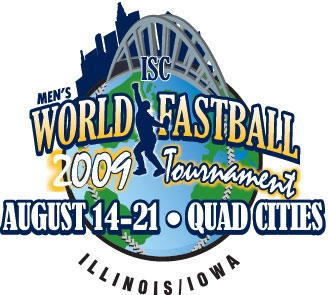
Bayonne native Rich Hoppe, a member of the fast-pitch softball team the King and His Court, on the diamond at Memorial Park in Linden last week.
Patrick Villanova/The Jersey Journal
Bayonne native Rich Hoppe, a member of the fast-pitch softball team the King and His Court, on the diamond at Memorial Park in Linden last week.
He stands blindfolded, some 40 feet from home plate, gleefully hurling pitch after pitch at weary batters as fans in Linden’s Memorial Park cheer on the peculiar feat.
He is Rich Hoppe — Bayonne native and pitcher for the King and His Court, the iconic four-man barnstorming softball team.
Founded in 1946 by Hoppe’s mentor, “The King” Eddie Feigner, the King and His Court travels the country and globe playing exhibition games, with proceeds often going to charity.
The catch?
Hoppe and his crew only use a pitcher, a catcher, a first baseman and a shortstop, while the opposition uses nine players.
Score isn’t kept, and in fact, you’re likely to see Hoppe or one of his teammates run from first base across the infield to third, bypassing second base altogether, to the laughter and enjoyment of the crowd.
Basketball has the Harlem Globetrotters. Men’s fast-pitch softball has the King and His Court.
“It’s entertainment — it’s comedy,” Hoppe says.
For Hoppe, it all started in 1961 when he was a junior in high school and saw Feigner and his team play in Bayonne. Enthralled by what he saw, Hoppe hooked up with Feigner’s crew for Midwest tours the following two summers.
After making a name for himself in the 1970s as a premier men’s fast-pitch softball pitcher, Hoppe re-joined the King in the 1980s and has been in the signature red, white and blue uniform ever since. It has taken him all over the world, playing in the smallest of American towns, at USO events for American soldiers, and even in prisons against inmates.
But Hoppe’s story is about more than just trick pitches and entertaining a crowd. Hoppe has fought his own wars away from the diamond, on the battlefields of Vietnam and in the darkest trenches of his personal life.
Drafted into the Army and sent to Vietnam in 1966, on his 13th day at war the 19-year-old Hoppe witnessed three fellow soldiers get decapitated by a mine. Later that night, Hoppe saw two children blown up right in front of him during a Viet Cong raid.
“I had lost any courage to do anything. It took me years to talk about it,” Hoppe said. “No matter what they trained you in, you haven’t seen that.”
Hoppe said he relied on a mixture of Vietnamese marijuana and black tar heroin to cope with the emotional and psychological damage that the incident and the war had on him. “I went to the other side,” Hoppe said, referring to his mental state. “You don’t care. It’s beyond dangerous, it’s numb.”
Upon returning home after two years at war, Hoppe opened a bar in Bayonne and began attending night school. He quickly became a successful businessman and got back into softball, but his alcohol and drug addictions intensified.
His life would then come crashing down in 1988, when his brother Robert died of AIDS. Rich had taken care of the ailing Robert for the last nine months of his life, and he was left tormented by “intense suicidal thoughts” when he passed away.
“After my brother died and that 100 days that followed, I literally had lost everything,” Hoppe said. “I was a broken man.” In the aftermath of his brother’s death, Hoppe faced down his addictions and got his life back on track. He’s been with the King and His Court ever since.
To Hoppe, it is not merely a softball team, but a means to rediscover himself and spread a message of hope. “It became my anchor,” Hoppe said. “This is big. It’s always been my Yankee Stadium. You get to touch people and leave them with a message.”
After last Thursday’s game in Linden, Hoppe, who has been clean and sober for two decades, briefly shared his story with the crowd. He hopes to inspire all of those who have battled addiction and felt trapped within their own lives. “I know what I am, a recovering addict,” he said. “I found a way out.”
Editor’s note: Rich was a teammate of mine in 1986 with the Lakewood Chameleons, where we were honored to share a dugout with two ISC Hall of Famers, Kevin Herlighy and Greg Sepulveda.











 =”” />
=”” />